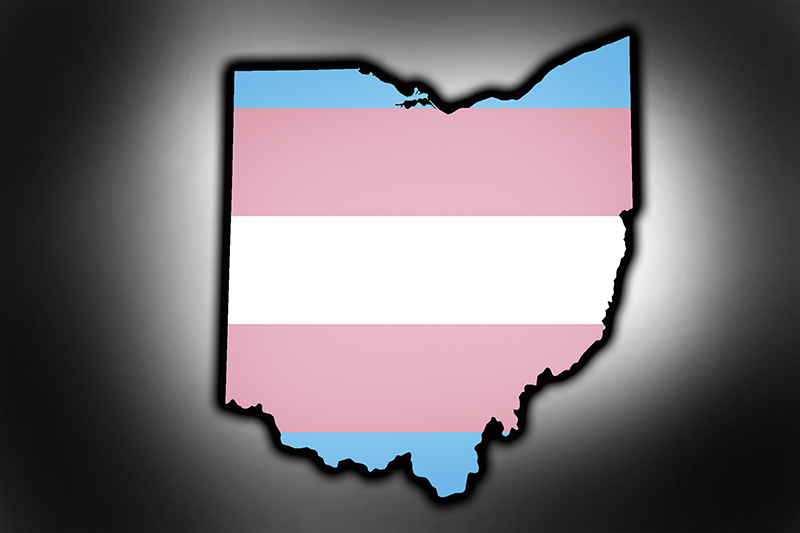Florida Bans Gender-Affirming Treatments for Transgender Youth
Rule would impose sanctions on doctors who prescribe gender-affirming treatments to minors suffering from gender dysphoria.

Two Florida medical boards finalized a draft rule to ban medical interventions for transgender minors.
The Florida Board of Medicine and Board of Osteopathic Medicine voted on Friday to approve the rule, which will now go through a public comment period over the next few weeks. The rule prohibits doctors from prescribing puberty blockers, hormone therapy, or surgical interventions for anyone under the age of 18.
The boards split on an exception for youth enrolled in Food and Drug Administration Institutional Review Board-approved, university-centered clinical research trials, with the Board of Medicine eliminating the exception, and the Board of Osteopathic Medicine retaining it, reports ABC News. That means the two boards will uphold different standards of care.
Transgender youth who are already receiving treatments under the FDA research trials will not be affected by Florida’s ban, according to ABC.
Florida’s decision to ban gender-affirming treatments for transgender youth comes during an election cycle in which lawmakers — primarily Republicans — in 25 different states have sought to ban transition-related care for minors. Both Alabama and Arkansas have passed legislation nearly identical to the rule approved by the Florida medical boards, with both being blocked by federal courts. Arizona passed a separate bill earlier this year that bars only surgical interventions on transgender youth.
Critics of the Board of Medicine and Board of Osteopathic Medicine say that the outcome of the vote on the proposed rule was a foregone conclusion, as Republican Gov. Ron DeSantis, and Dr. Joseph Ladapo, a DeSantis appointee who serves as the surgeon general of Florida, have both come out vocally not only against gender-affirming treatments, but even social transition, which involves no medical interventions.
Both men have argued that such care is unnecessary because many children experiencing “gender confusion” will ultimately end up identifying as the gender matching their assigned sex at birth, and both have claimed that there isn’t enough medical evidence on the long-term effects of gender-affirming health treatments that would justify allowing physicians to prescribe such interventions.
In June, the Florida Agency for Health Care Administration, which oversees the state’s Medicaid program proposed a rule to prohibit Medicaid from covering the costs affiliated with any transition-related procedures, even for adults. That rule was approved two months later — despite concerns that it might violate nondiscrimination provisions in the Affordable Care Act.
Also in June, the AHCA released its own report panning gender-affirming medical care, deeming it “experimental” and not sufficiently grounded in science. But critics have charged that such characterizations are themselves politically motivated, in order to curry favor with the DeSantis administration.
Dr. Kellan Baker, the executive director of the Whitman-Walker Institute and an expert in transgender health care, told Metro Weekly in an interview that the rule — under which doctors would be fined or subject to sanctions, potentially even losing their medical license, if they prescribe such care to minors — is problematic, because it infringes on physicians’ free speech rights and their duty to recommend the best course of care for individual patients.
Regarding the science of gender-affirming treatments like puberty blockers or hormones, Baker claims the medications are effective at treating gender dysphoria and do not cause harm to patients receiving them, noting that both cisgender minors with certain medical conditions and transgender minors have been receiving such care for decades, making their effects well known to members of the medical community.
“The science is quite clear that gender affirmation, social transition for children before puberty, puberty-delaying medications for adolescents, all these things are helpful for making sure that young people are healthy, are well, are supported, are affirmed,” he says. “And so the idea that there is not sufficient medical evidence or scientific evidence in this area is a politically-motivated belief rather than something that is actually based on fact.”
Regarding surgical interventions, Baker says the frequency with which they occur has been overhyped by the media.
“No one is rushing young people into surgery. It is actually very difficult to get approval for surgery when you are a minor because no expert standard explicitly recommends surgery for people under the age of 18, except in extremely rare cases where we’re talking about very severe gender dysphoria that cannot be alleviated by any other means,” he says. “And the process for demonstrating that and documenting that is very lengthy. And if you look at the Reuters article that came out recently where they were looking at the database of the frequency of these procedures, there are very, very few of them, particularly in comparison to cisgender adolescents, who are undergoing surgical procedures for things such as breast augmentation.”
Asked about people who claim to have transitioned and undergone surgery, only to regret the experience, Baker says he believes that people are making a decision to focus on rare cases rather than the majority of transgender people’s experiences, in which people do not regret transitioning. He also criticized the classification of some people who are gender-nonconforming in the count of “transgender” kids, 80% of whom — according to conservatives — will eventually “outgrow” their gender dysphoria.
“That [assertion] is based on flawed diagnostic criteria. It’s based on lumping in the tomboys and all the other kids who are gender-nonconforming, and whose parents are concerned about them and send them to a psychologist who says, ‘I consider this kid trans.’ And so if you’re counting a whole bunch of young people who aren’t trans in your ‘trans’ group, and then saying, ‘80% of them aren’t trans,’ of course they’re not. They never were in the first place,” says Baker.
“Now that we have more refined diagnostic criteria, the people who are getting care are the people who are moving into gender affirmation. Those are people who should be considered ‘trans.’ And by and large, close to 98% of them are still trans years later,” he says, citing a Dutch study, published in The Lancet, examining transgender patients who began puberty blockers in adolescence.
“I also think it’s important to look at the sort of big underbelly of the iceberg that isn’t being talked about, which is all of the people who aren’t able to access gender affirming care and what happens to them,” says Baker. “Because we see, in the disparities that come from research into trans population health, what happens when people aren’t able to access gender affirming care. They’re not able to access appropriate ID documents. That makes it hard to go to school. That makes it hard to get health care. That makes it hard to get a job. That makes it hard to walk down the street safely. That’s where we see these disparities around higher rates of mental and behavioral health concerning suicide and violence.”
Baker adds that he sees no medical justification for opposing social transition for transgender-identifying minors other than animus towards transgender people.
“I think it’s based in the belief that trans people shouldn’t exist. It’s not about science. It’s about politics,” he says. “Making decisions on the basis of politics rather than on decades of expert medical science and standards is a bad idea. It’s bad for the health of patients, and it sets a really bad precedent that politicians know more about your health than you do or that your doctor does or than expert medical associations do.”
Support Metro Weekly’s Journalism
These are challenging times for news organizations. And yet it’s crucial we stay active and provide vital resources and information to both our local readers and the world. So won’t you please take a moment and consider supporting Metro Weekly with a membership? For as little as $5 a month, you can help ensure Metro Weekly magazine and MetroWeekly.com remain free, viable resources as we provide the best, most diverse, culturally-resonant LGBTQ coverage in both the D.C. region and around the world. Memberships come with exclusive perks and discounts, your own personal digital delivery of each week’s magazine (and an archive), access to our Member's Lounge when it launches this fall, and exclusive members-only items like Metro Weekly Membership Mugs and Tote Bags! Check out all our membership levels here and please join us today!



























You must be logged in to post a comment.